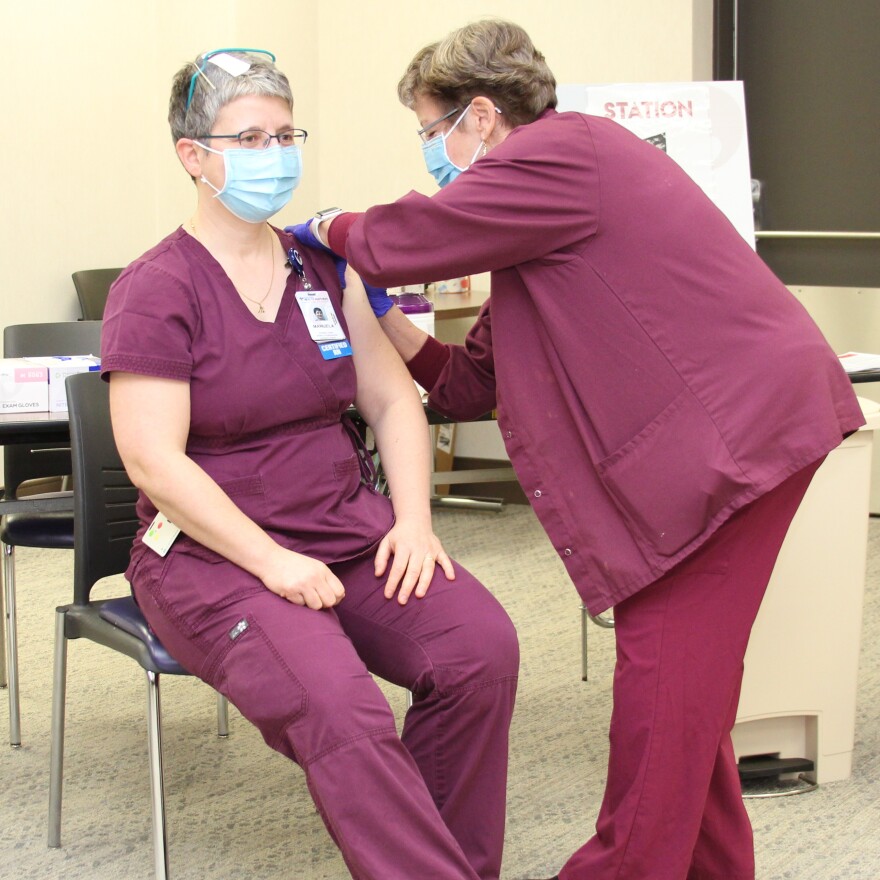State health officials say some 26,800 doses of a second, new COVID-19 vaccine arrived in Alaska yesterday (Monday).
“Dec. 21, shipments of Moderna have arrived in Alaska.”
That’s Dr. Tessa Walker Linderman, is the DHSS lead for the Alaska COVID-19 Vaccination Task Force. Dr. Linderman is a Nurse Consultant for the Division of Public Health.
She told reporters yesterday the Food and Drug Administration granted emergency use authorization to Moderna just last Friday (Dec. 18) for this vaccine. People age 18 and up can get it.
The Moderna vaccine has at least one big advantage over the Pfizer (FEYE-zer) vaccine that started rolling out in Alaska last week: logistics. Pfizer’s must be held at extremely cold temperatures that regular freezers can’t reach. After thawing, Pfizer’s vaccine can only be kept at refrigerator temperatures for a few days.
One shipment of the Pfizer vaccine was out of the fridge for too long. Matt Bobo with Public Health’s Section of Epidemiology said one shipment to Ketchikan spoiled last week and had to be thrown out. Ketchikan’s first vaccine shipment.
Matt
Moderna’s vaccine is stable at negative 4 degrees Fahrenheit, and is OK in refrigerators for up to 30 days.
Otherwise, the two vaccines share a lot of characteristics. Both require two doses. The second dose of Moderna’s vaccine is supposed to be given four weeks after the first. Pfizer and Moderna’s vaccines are not interchangeable.
More potential COVID-19 vaccines being developed by AstraZeneca and Janssen are in clinical trials and may come to Alaska.
In Moderna’s clinical trial, common reactions included fatigue, muscle pain or soreness, headache, chills and fever. Out of the 15,000 plus people who got the vaccine in the trial, no one had a severe allergic reaction, (also known as an anaphylactic reaction) like a health worker at Fairbanks Memorial Hospital last week, who was treated immediately and recovered quickly.
More details about Moderna’s vaccine and results from its clinical trial are available in this FDA briefing.
Anaphylaxis is a rare reaction to many common injections. It’s a life threatening condition, but one that first responders and doctors can readily treat.
State health officials know of 11 possible allergic reactions to the Pfizer vaccine in Alaska that emerged during the 10 minute observation period after injection. Eight at Bartlett Regional Hospital in Juneau, two at Providence Alaska Medical Center in Anchorage, and the one at Fairbanks Memorial Hospital.
Vaccine adverse reactions
Dr. Linderman says all of the patients’ symptoms went away and they’re all OK.
State health officials say that at least 5,600 (5,674) doses of the Pfizer vaccine have been administered in the state as of Sunday. They will add the information on the state’s COVID-19 dashboard as vaccinators are able to report their successful distribution.
The supply of both vaccines is limited. Frontline hospital workers and long-term care facility residents and staff are at the front of the line, followed by EMS personnel and health care professionals more generally. A state committee of mostly health care professionals is fine tuning advice from the Centers for Disease Control and Prevention about who should be vaccinated when.
COVID cases
On the state’s weekly clinical update email there is a graphic showing the Estimated Epidemic Curve going down for the first time since summer. The curve takes a guess at how case reporting will continue in the next few weeks.
Yesterday’s new case count was 152, including 6 in Fairbanks and 7 in North Pole.
There are currently 123 people in Alaska’s hospitals with COVID-19
Thirteen of these patients are on ventilators. 183 Alaskans have died of the disease.



